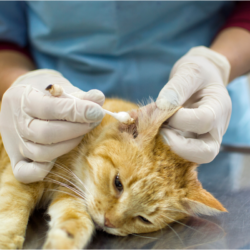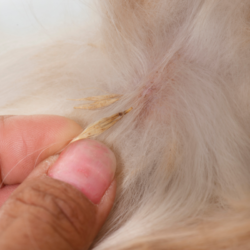Whatever your pet’s living conditions, whether you live in a flat or your furry companion is lucky enough to roam the great outdoors, he or she is likely tocatch worms. These parasites can then attack humans, causing everything from fatigue and diarrhoea to vomiting and widespread infestation. So worming your pet is essential .
Why, when and how should you worm your pets? Read our advice.
What are the different types of intestinal parasites in animals?
Roundworms
Roundworms, also known as nematodes, are among the most common internal parasites in our pets. The best-known genera include Toxocara in dogs and Toxascaris in cats. These parasites look like tiny spaghetti and can grow to an impressive length when fully grown. Puppies and kittens can be infested via their mother’s milk, making early and regular deworming essential. The presence of these parasites can cause abdominal distension, diarrhoea and, in severe cases, intestinal obstruction.
Tapeworms
Flatworms, or cestodes, include parasites such as tapeworms (Dipylidium caninum, Taenia spp.). Animals can contract them by ingesting infected fleas or by eating prey (such as rodents) which act as intermediate hosts. The rice-like segments of these worms can often be seen in the animal’s faeces or around its anus. Flatworm infestation can lead to weight loss and severe irritation in the animal.
Other parasites
As well as roundworms and tapeworms, there are other types of parasite that can affect animals’ gastrointestinal tract. For example, protozoa, such as Giardia and Coccidia, are small single-celled parasites that can cause severe diarrhoea, particularly in young or immunocompromised animals. Controlling these infections often requires specific treatment and rigorous hygiene to prevent reinfestation.
Detecting and treating these parasites requires a proactive approach from pet owners and competent veterinary care. Deworming is an effective control method and a key element in maintaining animal health and preventing zoonotic risks to humans. Regular screening tests can also help to identify the presence of these parasites, enabling timely and targeted treatment.
How do I know if my dog has worms?
Physical symptoms
Parasitic infestation in animals can manifest itself through a variety of physical symptoms that should alert the owner. The most common indicators include diarrhoea, sometimes accompanied by blood, noticeable abdominal distension, or the presence of worms in the animal’s faeces or around the anus. Unexplained weight loss despite a preserved or increased appetite can also be a sign of a high parasite load. Other symptoms such as a dull coat, irritated skin and signs of general weakness are also potential indicators of infestation that should not be overlooked.
Behavioural changes
As well as physical signs, changes in an animal’s behaviour can also indicate a possible parasitic infestation. Increased irritability, a tendency to hide more than usual, or excessive licking of the anal region are behaviours that can suggest discomfort linked to the presence of internal parasites. In addition, an infested animal may show signs of lethargy or a reduction in its usual activity, as parasites can affect its general well-being and energy levels.
Identifying and understanding these symptoms is crucial to the rapid diagnosis and treatment of parasitic infestations. Careful monitoring by owners and regular consultation with a vet are the best strategies for protecting your pet’s health and preventing the spread of parasites within the household. Regular deworming tailored to each animal is an essential part of prevention, ensuring a healthy home environment for all occupants.
What is deworming?
A dewormer is a pharmaceutical product specifically formulated to eliminate internal parasites, such as worms, that infest the digestive system of animals. These parasites, often invisible to the naked eye, can have a significant impact on the animal’s overall health. Deworming works by paralysing or killing these harmful organisms, allowing them to be expelled naturally from the host’s body.
Why is it necessary?
Deworming is a common term in the world of veterinary care, but its meaning and importance are not always clearly understood by all pet owners. However, knowing the basics of deworming is essential to ensure the well-being of our four-legged companions and the protection of our domestic environment.
Regular worming is a vital preventive practice. It helps to control and reduce the population of parasites that can cause diseases such as toxocariasis or echinococcosis, which can not only affect the health of animals but also present zoonotic risks for humans. As well as protecting the animal’s health, deworming prevents contamination of the environment, particularly communal living areas where children and adults may be exposed to parasite eggs.
The importance of choosing the right dewormer for your dog
It’s also important to note that some parasites have developed resistance to common dewormers, making product selection and adherence to the treatment protocol even more crucial. What’s more, the choice of dewormer can vary depending on the species, age, weight and lifestyle of the animal (indoor versus outdoor pets), which underlines the importance of consulting a vet for a personalised deworming programme.
Finally, deworming is part of animal welfare, a concept that encompasses both the physical and mental health of our companions. A parasitic animal may be subject to discomfort, anxiety or stress, all of which have a negative impact on its quality of life. It is therefore imperative for all responsible pet owners to ensure regular and adequate pest control.
Including deworming in our pets’ care routine helps to prevent disease, keep our homes safe and maintain harmonious cohabitation between animals and humans. It’s a practice that’s not only beneficial, but necessary for the well-being of the whole household.
do I have to worm my dog? What are the consequences?
Risks for your pet
Failure to follow the worming protocol can expose your pet to a host of health risks. Internal parasite infestations are not to be taken lightly; they can lead to serious and even fatal illnesses. Without deworming, animals are likely to develop a high parasite load, which can affect their digestive system, leading to poor absorption of nutrients and, consequently, malnutrition and reduced immunity.
In addition, some internal parasites cause damage to internal organs. For example, heartworms, transmitted by mosquitoes, can cause serious damage to the heart and lungs. Symptoms include coughing, dyspnoea, exhaustion and, in the most advanced cases, can lead to congestive heart failure.
Risks for humans
Zoonoses are diseases or infections that can be transmitted from animals to humans. When a pet is not properly wormed, it becomes a potential vector for the transmission of parasites such as Toxocara canis (roundworms) and Echinococcus granulosus (echinococcal worms). These parasites can have serious consequences for humans, ranging from gastrointestinal disorders to much more severe conditions, such as toxocariasis or echinococcosis, which can affect various organs and lead to major health complications.
Regular deworming is therefore essential, not only to maintain the animal’s health but also to protect household members against diseases that could be avoided with proper prevention and a deworming programme monitored and recommended by a veterinary professional. This underlines the importance of taking the welfare of our animals seriously as an integral component of public health and environmental hygiene.
When and how often should you worm your pet?
Deworming depends on your pet’s lifestyle, environment and outside contacts. Do you often take your pet out in public areas? Does it have access to a garden? Does it come into contact with other pets?
Frequency of worming
Adult dogs and cats
For adult dogs and cats, the recommended worming frequency may vary depending on a number of factors, such as the environment in which they live (urban, rural), their contact with other animals, and their habits (being outdoors, hunting). As a general rule, twice-yearly worming is often recommended by vets for these adult animals. However, for animals that spend a lot of time outdoors or are in contact with parasites, quarterly worming may be necessary.
Puppies and kittens
For puppies and kittens, deworming protocols need to be administered more frequently. Start worming at two weeks of age and repeat every fortnight until they are three months old. After that, it is advisable to continue worming monthly until the animal reaches six months of age. This intensive approach is due to the vulnerability of young animals to infestations, which can seriously affect their growth and development.
Animals at risk
Certain animals are considered to be at greater risk because of their lifestyle or state of health. This group includes animals that have access to the outdoors, that live in areas endemic for certain parasitic diseases, or those that have already had recurrent infestations. Animals that are immunosuppressed or have pre-existing health conditions may also require a higher frequency of deworming. It’s vital to talk to your vet to work out a personalised worming plan that takes into account your pet’s specific risks and overall health.
By following these guidelines, pet owners can make a significant contribution to the prevention of parasitic diseases and ensure a healthier and safer environment for all members of the household. It’s essential to follow your vet’s advice to ensure that the frequency of worming is tailored to your pet’s specific needs, maximising the effectiveness of the treatment and the well-being of your companion.
Choosing the right dewormer for your pet’s health
Since worms are not visible to the naked eye, it’s quite difficult to know whether your pet has worms. And if so, which ones? Choosing the right dewormer is vital if you are to target the exact type of parasite you want to combat.
Vetoform dog wormer 50 tablets is ideal for canines. Made with natural plant extracts, Vetoform Dog Wormer 50 Tablets is effective against all known intestinal parasites and digestive problems in dogs. Garlic and mugwort extracts combined with chamomile purify the digestive system and relieve discomfort such as diarrhoea, bloating and flatulence. It helps your pooch to quickly regain health and well-being.
Administer the Vetoform tablet directly into the back of your pet’s mouth, then give him a little water to drink. The tablet can also be crushed and mixed into the food. The dosage is ½ tablet a day for 5 days for puppies over a month old, to be repeated every 6 months, and 1 to 5 tablets for adult dogs, to be repeated every 4 times a year at each change of season.
Worming pets, both cats and dogs, is essential for the health of the whole family. Find the best selection of worming products on your Soin et Natureonline pharmacy !







